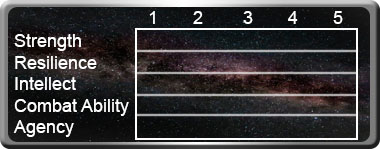Gale Power Grid
While Marvel's power grid is a rather useful standard with documented benchmarks for each score, some people will feel marvel's criteria isn't adequate for representing their respective character's qualities. Feel free to use this if you find it suits your needs.
Following is a description for each of the traits and benchmark points.
NOTE: On stats with "two bars," the blue one refers to what they can reliably and consistently do on their own power, whereas the red bar implies the requirement of specific circumstances, and are things the hero either will only do a handful of times per "season" or they have no control over.
The Five Attributes:
Strength
Self-explanatory.
1) Human
2) Peak Human: Examples: Blue Steel, Back Alley Brawler, Captain America (regular continuity), Batman.
3) Superhuman: Anywhere from lifting a car to a airliner (about 440 tons). Examples: Marauder, Statesman, Ultimate Captain America, Spider-Man, Black Panther.
4) Supernatural: Can lift a mountain if needed (about 20 billion tons). By "supernatural" be understood that the hero can do things not even other heroes are supposed to be able to do (like hurting otherwise invulnerable heroes). Examples: The Hulk, Ghost Rider.
5) Strength of Plot: As strong as the story needs the hero to be, which means sometimes they'll be only strong enough to get in fisticuffs with a mid-tier metahuman, and sometimes they'll be strong enough to lift an island or tow a planet. Examples: Galaxy Girl, Sister Psyche, Wonder Woman, Green Lantern, Superman (Silver Age).
Resilience
From mundane body armor to regeneration, Resilience shows the kind of damage a hero is expected to be able to shrug off in combat.
1) Human
2) Bullet Resistant: Examples: Blue Steel, Manticore, Bobcat.
3) Artillery Resistant: Examples: Marauder, Positron, Kheldians, Iron-Man.
4) Nuke Resistant: Examples: Statesman, Lord Recluse, Hero-1, The Hulk, Green Lantern.
5) Indestructible: Examples: Hamidon, Tyrant, Superman, Galactus.
Intellect
Even if what's going to be listed is mostly an average, it's important to remember there are sevent types of intelligence: Linguistic, Logic, Kinaesthetic, Spatial, Musical, Interpersonal, and Intrapersonal.
1) Human
2) Peak Human: Henry Pym (Ultimates)
3) Low-Tier meta-intellect: While it may be called "lesser," low-tier meta-intellect already sets a hero above the greatest minds of baseline humanity (even if the character may not be necessarily a scientist). Examples: Lord Recluse, Blue Steel, Batman, Amadeus Cho.
4) High-Tier meta-intellect: Meta-technology, super-science, magic, etc. For this hero, laws of physics and nature are optional. Examples: Positron/Anti-Matter, Doctor Science, Montague Castanella, Lex Luthor, Tony Stark, Doctor Doom.
5) Supra Genius: The hero is able to solve/figure out things not even other meta-geniuses are meant to solve/figure out. If something is not "unknowable," it is within this hero's immediate reach, and if it is, it just takes them a while longer (they key is that basically everything is just a matter of when). Examples: Lord Nemesis, Dream Doctor, Reed Richards.
Combat Ability
Regardless of whether armed or unarmed, combat ability reflects the kind of rivals the hero is expected to be able to take down.
1) Untrained: Unless the hero possesses resources that "auto-lock" on targets, they'll lose all and every fight.
2) Trained: While not Bruce Lee or John Rambo, the hero is assumed to be able to hold their own in most situations. Example: Miss Victory, Luke Cage, any member of the X-Men.
3) World Class: As long as the opponent doesn't possess any form of super-speed or super-reflexes, the hero can take them down. Examples: Back Alley Brawler, Punisher, Batman (post N52).
4) Inhuman: Possessing a form of preternatural awareness or speed is just the base requisite for picking a fight with this hero. Examples: Foreshadow, Blue Steel, Wonder Woman, Spider-Man.
5) Virtuoso: Virtually invincible. With the right tools/weapons, the hero will trivialize any challenge based on combat. If fighting another virtuoso, it's either a coin toss or up to the writer. Examples: Wolverine (the 90s' one), Squirrel Girl (yes, get over it), Batman (pre N52 i.e The Goddamn Batman).
Agency
Agency is the hero's ability to affect a story's events, regardless of the tools they use to do it (guile, superpowers, luck, etc).
1) Grunt/Supporting Cast: The hero has no ingenuity nor "utilitarian" superpowers (super-senses, "travel powers," gadgets, etc) to make up for their shortcomings. Without contrived happenstance and/or plot devices, the hero is stumped by something as basic as a treasure hunt or rescuing a kitten from a tree. Examples: Fusionette.
2) Low-level Plot Immunity: From utilitarian superpowers to plain resourcefulness and a keen mind, the hero will trivialize any problems on the "local scale" like buildings on fire or Nancy Drew mysteries. Examples: Blue Steel, the Fortunatas, Batman (post New 52).
3) Big Shot: The hero will trivialize most emergencies short of a doomsday scenario or a global conspiracy. Examples: Numina, Iron-Man.
4) World Savior: The hero can face doomsday scenarios and either undo them before they can harm the populace or actually reverse them. Examples: Superman in Superman Returns.
5) Power of Plot: The hero is more a plot device than a character. They can and will do anything as the story requires (mainly, whenever the writer paints themselves into a corner), including but not limited to: Impossible leaps of logic, implausible Rube/Goldberg-like plans to punch far above their weight-class, or outright plain omnipotence. Examples: Dream Doctor, Franklin Richards, Doctor Strange, The Tardis, the Moon Silver Crystal, the Bat Belt (Silver Age), Batman (pre N52 i.e The Goddamn Batman).
